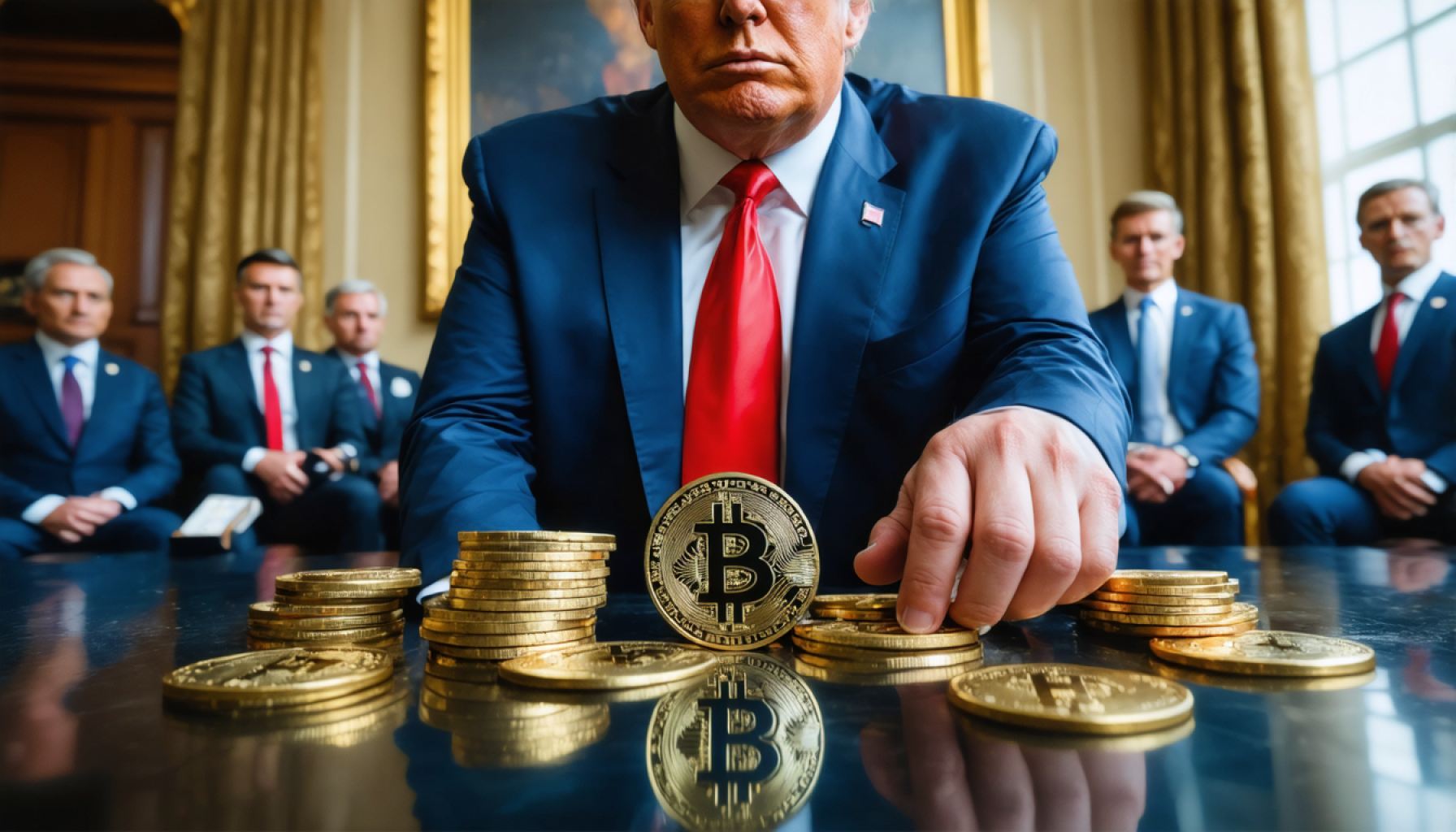- Cryptocurrencies have a history of association with illicit activities, with the FBI highlighting ongoing concerns over their use in crimes like fraud and human trafficking.
- Former President Donald Trump’s entry into the crypto world, particularly with the $TRUMP memecoin, has stirred political controversy and discussions on crypto regulation.
- Trump’s actions have raised concerns about potential corruption, as offers of political access with coin purchases alarm lawmakers about foreign influence.
- The proposed “End Crypto Corruption Act” calls for strict regulation to prevent misuse of digital assets by public officials.
- Trump’s crypto involvement complicates legislative efforts like the GENIUS Act, aimed at regulating stablecoins, amid decreasing support.
- The crypto community remains divided: some see regulatory leniency as a victory, while others fear it encourages risky speculation.
- As crypto merges with political interests, the challenge is finding a balance between innovation and regulation.
Cryptocurrencies have often found themselves perched on the edge of legitimacy, a magnet for both innovation and infamy. From their inception, they have been entangled with tales of scams, thefts, and criminal enterprises, casting a shadow of doubt over their potential. The FBI’s recent report paints a picture of pervasive criminality within the crypto realm, amplifying fears that digital assets facilitate illicit activities ranging from fraud to human trafficking.
Yet amid these murky waters, a new chapter is unfolding, and once again, it pulls a certain political titan into its narrative. Former President Donald Trump, amidst a flurry of controversy, has ventured into the crypto space, challenging old perceptions and stirring up waves that reach far beyond finance.
Trump’s involvement, especially with the launch of the $TRUMP memecoin, has reignited discussions about crypto’s future. Initially, his apparent embrace of digital currencies seemed to herald a new era of government acceptance, promising to elevate the U.S. to leadership in financial technology. This shift, encapsulated by an executive order to relax regulations on crypto, was seen as a win for enthusiasts hoping for mainstream acceptance.
However, the reality proves more complex. Critics argue that Trump’s foray into crypto, marked by offers of presidential access packaged with coin purchases, exposes potential corridors for corruption. A dinner invite at his Virginia golf club for top coin holders has attracted attention, as analysis suggests that more than half of these stakeholders are foreign entities. This raises alarms about possible breaches of laws that prohibit foreign political donations.
Political reaction has been swift and searing. Senators such as Richard Blumenthal have sounded the alarm, pointing to the dangers of mixing political influence with digital assets. The critical eye falls not only on Trump but on the broader implications for U.S. regulatory practices. There is a growing call for stringent oversight to curb any misuse of cryptocurrencies as political tools. The introduction of the “End Crypto Corruption Act” reflects these concerns, aiming to bar high-ranking officials from engaging in crypto ventures for personal gain.
The ramifications extend to legislative efforts, too. The Trump-driven crypto scenario has thrown a wrench in the progress of the GENIUS Act, legislation intended to regulate stablecoins. With support dwindling due to the current climate, its future remains uncertain.
Interestingly, within the crypto circle, there is discomfort as well. Some investors view the memecoin strategy as undercutting serious efforts to bring stability and respectability to the digital asset market. There’s a palpable urge to distance legitimate crypto ventures from marketing that echoes the infamous, chaotic days of unchecked financial speculation.
Despite the turbulence, there are those who see Trump’s crypto escapades as a triumph, notably for those who have lobbied hard for regulatory leniency. The SEC’s softened stance, seen in its handling of high-profile cases like those against Coinbase and Ripple, suggests a significant victory for the crypto community. Yet this leniency is a double-edged sword, provoking criticism from those who see it as a neglect of duty.
The path forward for cryptocurrencies, now undeniably intertwined with political narratives, remains fraught with uncertainties. Trump’s involvement has undeniably heightened the stakes, proving that in the world of digital assets, the line between innovation and exploitation is perilously thin. As politicians and regulators grapple with this new reality, one can only hope for a framework that can effectively balance entrepreneurial freedom with ethical governance. The crypto frontier, it seems, is still very much the Wild West.
Trump and Cryptocurrencies: A Bold Venture or a Political Quagmire?
Cryptocurrencies have long danced on the fringes of mainstream finance, caught between the promise of innovation and the pitfalls of infamy. Recent developments have added a new layer of complexity to this narrative, with Donald Trump’s venture into the crypto world amplifying both excitement and skepticism. As the former president’s involvement deepens, the crypto sphere finds itself at a crossroads, with significant implications for investors, policymakers, and the future of digital currencies.
Unpacking Trump’s Venture into Cryptocurrencies
1. The Introduction of $TRUMP Memecoin:
Trump’s introduction of the $TRUMP memecoin marks a controversial entry into the cryptocurrency market. A memecoin often capitalizes on pop culture and social media trends, sometimes lacking the financial backing typical of more established digital assets. This raises questions about the memecoin’s intrinsic value and longevity in the market. For investors, memecoins can represent high-risk, high-reward opportunities.
2. Political Implications and Regulatory Challenges:
The intertwining of cryptocurrency and politics, as seen with the $TRUMP memecoin, creates potential ethical and legal challenges:
– Foreign Influence Risks: The report that a significant portion of high-tier memecoin stakeholders might be foreign raises alarms over potential foreign intervention in U.S. political systems.
– Regulatory Response: Political figures like Senator Richard Blumenthal have called for increased scrutiny and stringent regulations to prevent the misuse of digital assets in political fundraising. The introduction of the “End Crypto Corruption Act” underscores this urgency, aiming to limit politicians’ involvement in cryptocurrencies.
How-To Navigate the Cryptocurrency Market Amidst Controversies
– Vet Potential Investments: Investors should conduct thorough due diligence before engaging with any cryptocurrency, especially emerging tokens like memecoins. Analyzing whitepapers, tokenomics, and developer credibility can offer insights into the legitimacy of a project.
– Monitor Regulatory Trends: Keeping abreast of evolving legislative efforts and regulatory changes can aid investors and professionals in adapting strategies accordingly. The outcome of acts like the GENIUS Act may directly influence the stablecoin market and broader crypto regulations.
Real-World Use Cases and Trends
Development and Application of Stablecoins:
Stablecoins aim to bridge traditional finance with the flexibility of digital assets, often pegged to a stable reserve like the U.S. dollar. Regulation, as suggested by the GENIUS Act, could shape their integration into mainstream financial transactions, affecting both businesses and consumers who rely on stable crypto assets for seamless global transactions.
Insights and Predictions for the Cryptocurrency Market
1. Market Growth Potential:
The introduction of more high-profile personalities into the crypto world can accelerate adoption among mainstream audiences. However, it also heightens scrutiny from regulators, who must balance fostering innovation with protecting consumers.
2. Regulatory Balance:
An effective regulatory framework that supports innovation while ensuring security and ethical governance may emerge as cryptocurrencies continue to intertwine with political narratives. The success of such a framework could be pivotal in defining the future trajectory of digital currencies.
Pros & Cons Overview
Pros:
– Increased Mainstream Attention: High-profile endorsements and controversies can accelerate public interest and potential adoption.
– Potential for Innovation: Cryptocurrencies can revolutionize finance, providing unprecedented transparency and efficiency.
Cons:
– Regulatory Uncertainty: Ongoing scrutiny could lead to abrupt regulatory changes, impacting market stability.
– Ethical Concerns: The potential for misuse as political fundraising tools poses ethical challenges.
Conclusion & Quick Tips for Investors
For those considering entering or expanding their presence in the cryptocurrency market, developing a robust understanding of both technological and regulatory landscapes is crucial. Consider diversifying investments to mitigate risks and remain informed about regulatory developments. Engaging with established platforms and seeking expert insights can further bolster investment strategies.
For further reading, visit Coindesk for comprehensive crypto news and analysis.












